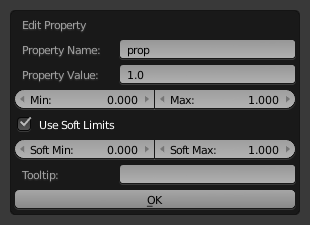Custom Properties¶

Custom Properties panel.
Custom properties are a way to store your own metadata in Blender’s data-blocks which can be used for rigging (where bones and objects can have custom properties driving other properties), and Python scripts, where it’s common to define new settings not available in Blender.
Only certain data supports custom properties:
- All data-blocks types.
- Bones and Pose-Bones.
- Sequence strips.
To add a custom property, find the Custom Properties panel, found at the bottom of most Properties Editor or Properties region, and hit Add.
Editing Properties¶
User Interface¶
Custom properties can be edited using the panel available for data types that support it.

Custom Properties edit pop-up.
- Property Name
- The name of the custom property.
- Property Value
This does two things, first it sets the default value of the custom property second, it define the type of property it is. For example, custom properties can either be of type: Integers, Floats, or Booleans. See the table below for a list of examples for each:
Integers: 1, 2, 3, 4… Floats: 3.141, 5.0, 6.125, Booleans: True, False Примечание
Booleans are handled very similar to integers and only work when using Min/Max values that are integers and that are no more than 1 apart.
At this point, the booleans will still look like integers but behave like booleans having one lower, off, value and a higher, on, value.
- Min
- The minimum value the custom property can take.
- Max
- The maximum value the custom property can take.
- Use Soft Limits
Enables limits that the Property Value slider can be adjusted to without having to input the value numerically.
- Soft Min
- The minimum value for the soft limit.
- Soft Max
- The maximum value for the soft limit.
- Tooltip
- Allows you to write a custom Tooltip for your property.
Python Access¶
Custom properties can be accessed in a similar way to dictionaries, with the constraints that keys can only be strings, and values can only be strings, numbers, arrays and nested properties.
See the API documentation for details.